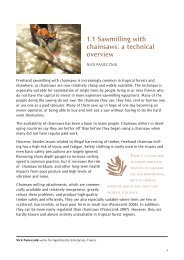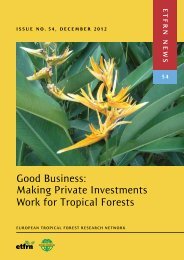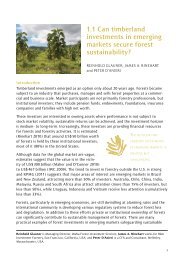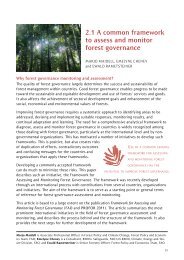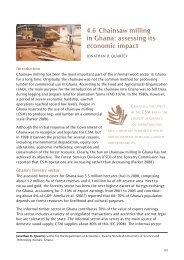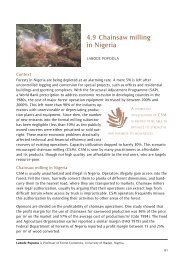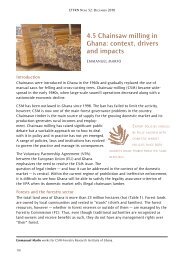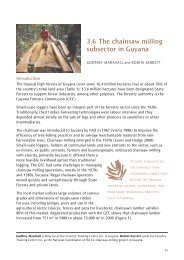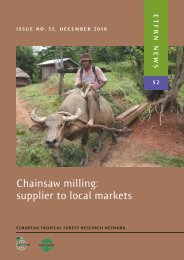Chainsaw milling: supplier to local markets - European Tropical ...
Chainsaw milling: supplier to local markets - European Tropical ...
Chainsaw milling: supplier to local markets - European Tropical ...
You also want an ePaper? Increase the reach of your titles
YUMPU automatically turns print PDFs into web optimized ePapers that Google loves.
3.4 FoREsT commuNiTiEs aND lEgal TimbER iN ThE EcuaDoRiaN amazoN<br />
<strong>Chainsaw</strong> <strong>milling</strong> is the main mean of production for sawn timber. unfortunately, it yields<br />
less than 50% of the standing trunks (Gatter and romero 2005); more efficient technologies<br />
that improve quality and the cutting process — such as guide frames or band saws —<br />
are not widely used. implementing basic rules of forest management as a mechanism for<br />
maintaining forest cover that allows for sustainable forest use and contributes <strong>to</strong> poverty<br />
alleviation has not been widely promoted in Ecuador.<br />
objective and methodology<br />
our study 1 analyzed the use and sale of timber produced by chainsaw <strong>milling</strong> in a small selection<br />
of indigenous and settler organizations in the amazon region of Ecuador (box 1).<br />
interviews with key ac<strong>to</strong>rs and consultative meetings with selected organizations in two<br />
different situations were held.<br />
it was assumed that small forest owners needed <strong>to</strong> cooperate in order <strong>to</strong> improve many<br />
aspects of their lives. There are three reasons for individuals <strong>to</strong> form an organization:<br />
economic, socio-political and cultural-traditional. These reasons also guide cooperatively<br />
organized market activities.<br />
Box 1. organizations in the study area<br />
• The Asociación Artesanal Agroforestal Kanus (asokanus) and the shuar<br />
community ofYukuip (known as nashE, its abbreviation in shuar) are indigenous<br />
peoples’ associations.<br />
• Pre-Asociación Madereros (pam) and Asociacón de Operadores de mo<strong>to</strong>sierras de<br />
orellana (asopEm) are organizations of timber traders and chainsaw opera<strong>to</strong>rs.<br />
members own one or more chainsaws and have interests in a communal timber<br />
yard. They are exerting political pressure for a new agreement with forest<br />
authorities that has simplified procedures.<br />
• Perla de la Amazonía and Las Canelas are <strong>local</strong> settlers’ organizations. Their<br />
members convert forest <strong>to</strong> establish pastures and crops and sell standing trees <strong>to</strong><br />
intermediaries. some members own their own chainsaw, but most rent them or<br />
hire a chainsaw opera<strong>to</strong>r.<br />
asokanus supports its members through communal technicians and the elaboration<br />
of management plans. under its micro-credit programme it provides about us$250–500<br />
for each member <strong>to</strong> cover the initial costs of timber harvesting and legal procedures. The<br />
organization itself mills the timber with two chainsaws and arranges the collaborative<br />
sale of timber. The timber is legal and has valid permits, and since its clients explicitly<br />
demand legal timber it receives a price premium. in addition, asokanus was the only<br />
<strong>local</strong> organization <strong>to</strong> do an inven<strong>to</strong>ry of the remaining forest s<strong>to</strong>cks and harvestable<br />
timber. asokanus is shifting from a traditional-cultural organization <strong>to</strong> an economic<br />
one; it facilitates but does not promote logging.<br />
79



